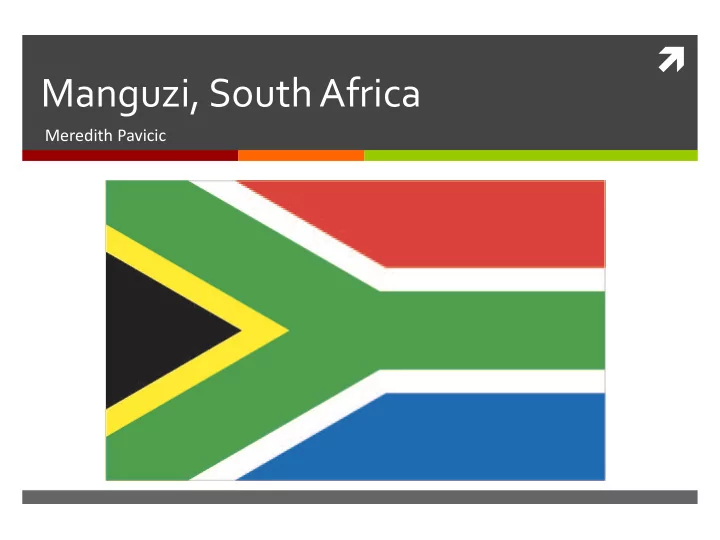

Manguzi, South Africa Meredith Pavicic
Manguzi
Hospital Regional Rural Government Hospital 304 inpatient beds: Male medical, female medical, male surgical, female surgical, pediatrics, maternity ward, and MDR (multi-drug resistant) tuberculosis wards Outpatient Department (OPD) and Resuscitation Unit (RU = ER in the US) Satellite and mobile clinics throughout Zwazulu Natal
Mobile and Satellite Clinics Staffed daily my local nurses, staffed one day/week with a physician • Follow up labs, Antenatal Care, referral centers •
Women’s Health in Manguzi, SA Women’s Studies degree + OB/GYN = interest in gender issues in healthcare Women are often at a healthcare disadvantage in developing nations due to decreased access to care and increased needs due to high pregnancy rates In societies where women have lower status, they are often abused and their needs are more often ignored
Pregnancy and Childbirth Antenatal care at “home” clinics – often satellite clinics closer to home Encouraged to have first birth in the hospital Others may be at clinic with successful vaginal birth, no complications or risk factors Midwives perform all vaginal deliveries Doctors only participate in assisted vaginal deliveries or C-sections Vaginal birth after C-section encouraged
High Risk Pregnancy Lower rates of Gestational Diabetes than US Less pre-existing DM in population Higher rates of Pre-eclampsia and Eclampsia Well-recognized fact, but unknown etiology – these problems are known to be more common in less developed countries Fetal growth restriction – malnutrition, teenage pregnancy
Family Planning Many women want to have a large number of children Often, women are skeptical of contraception Abortion is legal, but extremely stigmatized in SA culture Women often seek access through unlicensed and unsafe providers
Domestic Violence Little reliable data on actual rate of domestic violence in South Africa Infrequent reporting, existing police data unavailable to public Few services available, especially in rural areas or for those who do not speak Zulu or English Sociocultural barriers to reporting
Profound Clinical Experience 27 yo Somali woman G2P0 presents to OPD @ 11w2d with vaginal bleeding No FHT, retained products on US Dx with incomplete abortion Patient terrified of pelvic exam, screaming and crying; does not speak English or Zulu, but husband speaks Zulu Admitted for management of miscarriage
Cont. Difficulty with placement of cytotec d/t discomfort/screaming with pelvic exam New information: husband is actually the patient’s twin brother – he does not understand that this may be a problem, and this is likely why she is having her second miscarriage Due to language barrier and lack of services, social work unable to discuss with patient the reason for her miscarriages or asses whether she has been coerced into this marriage or sexually assaulted
Conclusions Most issues surrounding gender disparities are at their root socio-cultural Require broad-based social change and female empowerment Widespread change in perceptions of the roles of women and preferred family size
On the Wards Patient Chart Male Medical
Operating “Theater”
Recommend
More recommend